Nepal, Bangladesh, Sri Lanka: Is South Asia fertile for Gen Z revolutions?
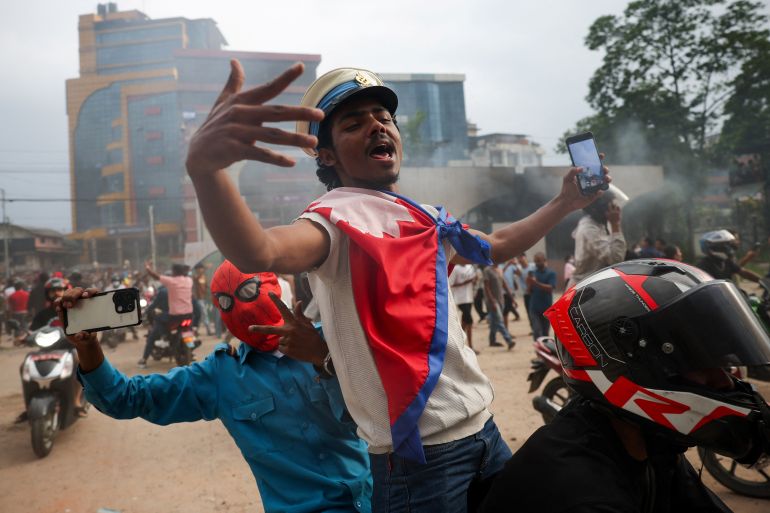
New Delhi, India — The rattle of iron gates sounded like drumbeats as the crowd surged forward. A sea of bodies stormed through the barricades, which had stood as sentinels of power barely hours ago. The hallways of the house of the country’s leader echoed with the thunder of muddy footsteps. Some smashed windows and artefacts, others picked up luxury bedsheets or shoes. The building and its plush interiors had been symbols of crushing authority, impenetrable and out of reach for the country’s teeming millions. Now, however, they briefly belonged to the people. This was Nepal last week. It was also Sri Lanka in 2022, and Bangladesh in 2024. As Nepal, a country of 30 million people sandwiched between India and China, now plots its future in ways alien to traditional electoral democracies, the spate of youth-led protest movements that have toppled governments one after the other in South Asia has also sparked a broader question: Is the world’s most densely populated region Ground Zero for Gen Z revolutions? “It’s certainly very striking. There’s this kind of new politics of instability,” said Paul Staniland, an associate professor of political science at the University of Chicago, whose research focuses on political violence and international security in South Asia. On Thursday, some 10,000 Nepali youth, including many in the diaspora, voted for an interim prime minister not through physical or electoral ballots, but through an online poll on Discord, a platform primarily used by gamers. Nepal, where three days of protests against corruption and nepotism turned violent, with a crackdown by security forces leading to the death of more than 70 people, has announced new elections in March. Advertisement But the protests, which forced Prime Minister KP Sharma Oli to resign days after he had mocked the Gen Z origins of the agitators, have already shown that in nation after nation in South Asia, increasingly frustrated young people are grabbing power and declaring themselves boss when they feel betrayed by political systems out of tune with their demands. This is a dramatic shift for South Asia, a region that has long been home to major political protests, but rarely ones where regimes are overthrown, Staniland told Al Jazeera. “This is a very different kind of orientation from a world that has military coups, or the main form of political conflict is something else,” he added, referring to the ways political crises in the region have previously often played out. Each of the protest movements – in Sri Lanka, Bangladesh and Nepal – was rooted in specific histories and was triggered by events unique to that country. Yet, analysts say, there is a common thread that runs through the rage that exploded in these countries: a generation that is refusing to live with broken promises, and the factors driving them. These movements, experts say, also appear to be learning from each other. From Colombo to Dhaka to Kathmandu: The backdrop The Gen-Z protests in Kathmandu kicked off after the government banned social media platforms, citing misuse and the failure of the platforms to register with regulators. But the grievances ran much deeper: inequality, corruption and nepotism were the major triggers for young people in a country where remittances sent home by Nepalis abroad represent a third of the nation’s economy. Thousands of teenagers hit the streets, many still in school uniforms. More than 70 people were shot dead, and hundreds more were injured. But the violence unleashed on protesters by security forces only aggravated the crisis. Some demonstrators torched the parliament, while others set the houses of other political parties, some leaders, and even Nepal’s largest media house on fire. Protesters also broke into Oli’s house, ransacking it. Oli resigned a day later. It was very different in Bangladesh in 2024. There, it began with a student-led campaign against discriminatory job quotas. But by the summer, after a series of police crackdowns on mostly peaceful protesters killed hundreds of civilians, the movement’s character shifted to a broad coalition demanding an end to Prime Minister Sheikh Hasina’s long hardline government. Protests had a loose leadership structure: student leaders issued ultimatums and lists of demands to the government, and opposition figures provided support. Everything Hanisa’s government did – from brutal assaults on student agitators to telecommunications blackouts – only aggravated the crisis. Ultimately, on August 5, 2024, the prime minister quit, escaping to close ally India by helicopter. Advertisement Two years before the upheaval in Bangladesh, Sri Lanka had its own moment. There, the protests were a response to an economic collapse as Sri Lanka defaulted on its debt. By March 2022, daily life had become dire: 12-hour power blackouts, miles-long queues for fuel and cooking gas, and inflation above 50 percent. Sri Lanka’s “Aragalaya” movement, which stands for “The Struggle” in Sinhala, was born. Youth activists set up a protest camp they called “GotaGoGama” (“Gotta Go Village”), in front of Colombo’s Presidential Secretariat. It was a reference to President Gotabaya Rajapaksa, whose family had governed the country for 15 of the previous 18 years. The site became a hub of rallies, art performances and speeches. In mid-July, Rajapaksa fled the country after his residence was overrun by demonstrators. Demonstrators capture footage on their mobile phones outside the Parliament complex, during a protest against the killing of 19 people, after anticorruption protests and during a curfew in Kathmandu, Nepal, September 9, 2025 [Adnan Abidi/Reuters] ‘Dissonance was too high’ To Meenakshi Ganguly, deputy Asia director of Human Rights Watch, the overthrow of powerful governments by youth-led movements in the three countries has common foundations: unaddressed socioeconomic disparities and corruption by an entrenched political elite that left them disconnected from the challenges of younger generations. Many in Gen Z have experienced two economic recessions in their lifetimes: in 2008-09 and then in the wake of COVID-19. Ganguly said that the generation had also two formative years in isolation, cut off from their peers physically, though those pandemic years also amplified their use of digital platforms to unprecedented
Duplantis breaks pole vault world record to win gold in Tokyo

Sweden’s Armand ‘Mondo’ Duplantis sails over the bar to set a 14th pole vault record at the World Athletic Championships in Tokyo. Published On 15 Sep 202515 Sep 2025 Click here to share on social media share2 Share Mondo Duplantis has broken the pole vault world record for the 14th time with a jump of 6.3m (20ft, 8 inches) on his third attempt as he wins a third straight world title. The gold medal was already secure for the American-born Swede on Monday when he had the bar raised a centimetre (0.4 inches) higher than the record height of 6.29m he managed in Budapest last month. Recommended Stories list of 3 itemsend of list He failed by the narrowest of margins at his first two attempts but, roared on by a captivated crowd at the National Stadium, slid over on the third with the bar giving a slight wobble before settling. The stadium exploded as the 25-year-old raced over to celebrate with his family in the crowd before being mobbed by his delighted rivals. It was a stark contrast with the scenes at the same arena four years ago when Duplantis won the first of his two Olympic titles with the Tokyo public locked out because of the COVID pandemic. Seven of the 12 vaulters cleared 5.90m in an unusually strong competition but the contest, such as it was, soon came down to Duplantis and Greece’s Emmanouil Karalis. Karalis, bronze medalist behind Duplantis at the Paris Olympics, secured the silver medal with a jump of 6.00m but failed at 6.10m, 6.15m and 6.20m as he tried to put some pressure on the reigning champion. Duplantis sailed over at 6.10m and 6.15m and then gave the crowd and athletics world what it wanted with his fourth world record jump of the season. Duplantis sets his new world record in the men’s pole vault final [Ben Stansall/AFP] Adblock test (Why?)
Trump is moving away from aiding Ukraine
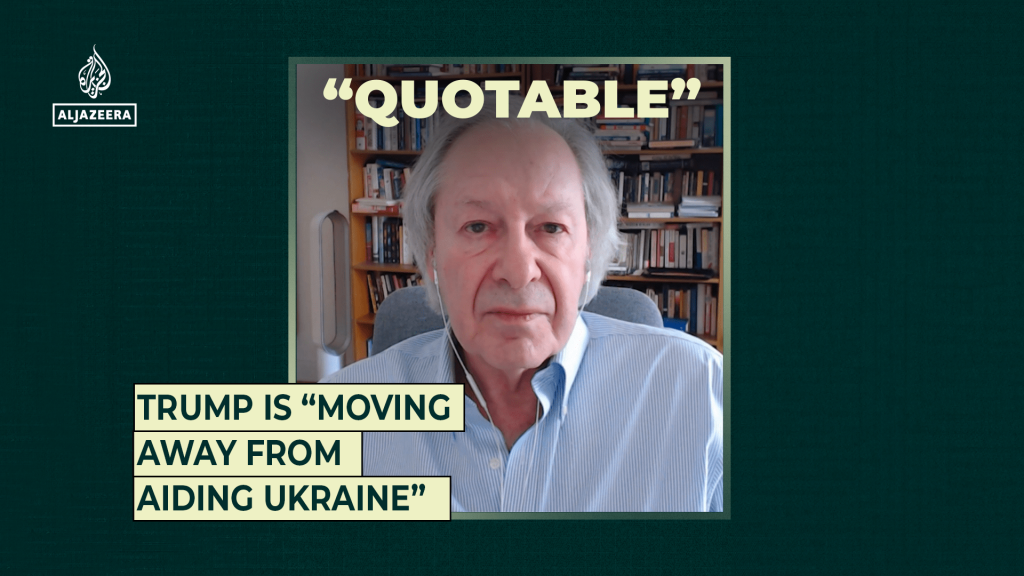
New York Times correspondent Steven Erlanger says Trump is pulling back on sending arms and money to Ukraine but continues providing a key element: operational intelligence. Published On 15 Sep 202515 Sep 2025 Click here to share on social media share2 Share Adblock test (Why?)
Who are the 57 members of the Organisation of Islamic Cooperation?
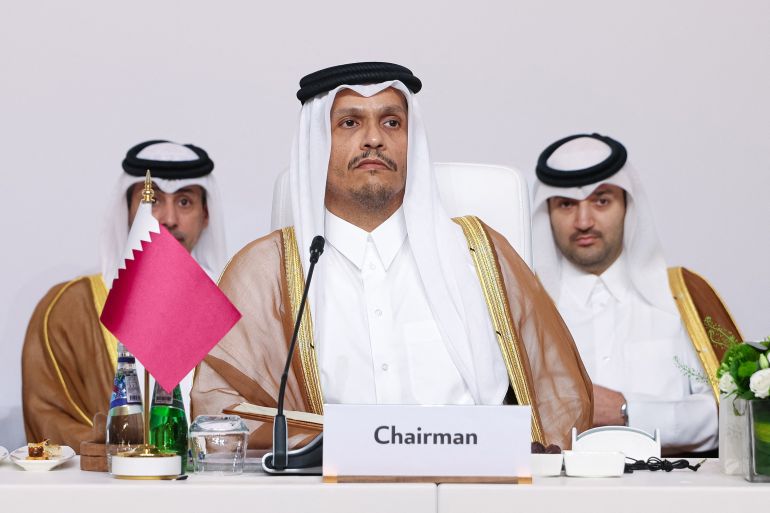
Leaders from across the Arab League and the Organisation of Islamic Cooperation (OIC) have gathered in Doha for an Arab-Islamic summit to forge a unified stance on Israel following its attack on a Hamas office in Qatar’s capital on September 9 that killed six people. The emergency summit of the Arab League and OIC began on Monday, following a closed-door meeting of foreign ministers in Doha, where a draft resolution outlining concrete measures against Israel was prepared. “It’s time for the international community to abandon dual standards and to hold Israel accountable for all the crimes it has committed,” Qatari Prime Minister Sheikh Mohammed bin Abdulrahman bin Jassim Al Thani said before the meeting, adding that the attack must be met with “fierce” and “firm” measures. Qatar’s Prime Minister Mohammed bin Abdulrahman bin Jassim Al Thani chairs a preparatory meeting in Doha on September 14, 2025, before the Arab-Islamic summit [Handout image from Qatar’s Ministry of Foreign Affairs via AFP] The Qatari leader also chided Israel’s continuous derailment of Gaza ceasefire talks, stating: “Israel must know that the continuous genocidal war against the Palestinian people, aiming at forcibly transferring them outside their homeland, cannot succeed, no matter what false justification is provided.” Israel’s attack on Qatar was part of a broader wave of strikes extending beyond its borders, marking the sixth country Israel had targeted in 72 hours and the seventh since the start of this year. [Al Jazeera] Who are the 22 members of the Arab League? Among the attendees are representatives from the Arab League, a group of 22 member nations stretching from North Africa to the Gulf and representing primarily Arab-majority states, with a combined population of nearly 500 million — about six percent of the world’s population. Advertisement Officially known as the League of Arab States, the Arab League was established in Cairo on March 22, 1945, by seven founding members: Egypt, Iraq, Transjordan (now Jordan), Lebanon, Saudi Arabia, Syria and Yemen. Its creation reflected the shared desire of Arab countries emerging from colonial rule to coordinate their political stances, promote regional solidarity and safeguard their sovereignty and independence. Over the decades, membership grew to 22 states, stretching from North Africa to the Gulf. Egypt was suspended in 1979 after signing a peace treaty with Israel, but its membership was reinstated in 1989. Libya was suspended during the 2011 uprising but readmitted later that year. Syria was suspended in 2011 amid its civil war and reinstated in 2023. [Al Jazeera] The group accounts for about 3.25 percent of global gross domestic product (GDP), with several members ranked among the world’s leading oil producers. Countries such as Saudi Arabia, Iraq, Kuwait, the United Arab Emirates, Libya, and Algeria are also part of the Organization of the Petroleum Exporting Countries (OPEC), and hold some of the largest proven oil reserves. Collectively, Arab League members produce about a quarter of the world’s oil. All Arab League members are also part of the 57-member OIC. Who are the 57 members of the OIC? The OIC, which was formed in 1969 in response to an arson attack on Jerusalem’s Al-Aqsa Mosque, brings together 57 countries with significant Muslim populations across Asia, Africa, Europe, and the Americas. In September 1969, Muslim leaders met in Rabat, Morocco, to establish a body that would safeguard Islamic holy sites, protect shared political and economic interests, and promote solidarity among Muslim-majority nations on the global stage. Over time, its membership expanded from 30 to 57 states, reflecting its growing reach. Today, the OIC represents more than 2.1 billion people — about 26 percent of the world’s population and 8 percent of the world’s GDP. [Al Jazeera] In its early years, the OIC had loose membership rules. Its original charter allowed any Muslim state to join with the approval of two-thirds of existing members, which opened the door for countries without Muslim majorities but with significant Muslim populations. These include Gabon, the Maldives, Mauritania, Uganda, Mozambique, Cameroon, Togo, Benin, the Ivory Coast and Guinea-Bissau. In the Americas, Guyana and Suriname joined despite having relatively small Muslim communities. The 2008 charter revision made membership stricter. Now, a country must be a United Nations member (with Palestine as the exception), have a Muslim-majority population, abide by the charter and apply formally. Even then, admission requires consensus among all 57 members — a difficult task. Advertisement Albania is the only European state in the OIC. The organisation has maintained a consistent and forceful stance against Israeli actions, particularly regarding occupation and military offensives in Palestine. Over the past three years, the OIC has convened several emergency summits and ministerial meetings — most notably in Riyadh, Jeddah and Istanbul – to condemn Israeli attacks on Gaza, the occupied West Bank, and, more recently, strikes involving Iran and Qatar. The group has repeatedly called for immediate ceasefires, protection of Palestinian civilians and international accountability for what it describes as “Israeli crimes”. Adblock test (Why?)
India vs Pakistan Asia Cup match hit by ‘no handshake’ controversy
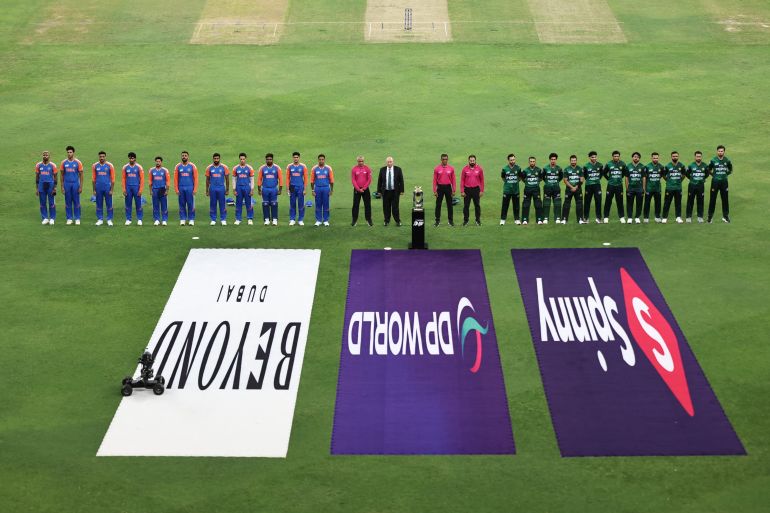
Dubai, UAE – The wide-ranging ramifications of an ongoing political standoff between India and Pakistan have led to a controversial conclusion of the archrivals’ cricket match at the Asia Cup 2025 in Dubai, where India’s captain Suryakumar Yadav confirmed that his squad opted against shaking hands with their opponents as a mark of protest. When Sunday’s Group A fixture between the South Asian archrivals was confirmed after long deliberations from the Indian government, fans and experts had hoped that the on-field action could help cool the off-field heat. Recommended Stories list of 3 itemsend of list Yadav, though, crushed all expectations by saying his team’s thumping seven-wicket win in the T20 match was a “perfect reply” to Pakistan in the wake of the intense four-day cross-border conflict that brought both countries to the brink of an all-out war in May. “Our [Indian] government and the BCCI [Board of Control for Cricket in India] were aligned on the decision to play this match. We came here just to play the match and gave them [Pakistan] a perfect reply,” Yadav told the media shortly after the match. What happened at the end of the India vs Pakistan match? Yadav, who hit the winning runs for India, walked off the field alongside his batting partner, Shivam Dube, without approaching the Pakistani captain and team for the traditional post-match handshakes. Pakistan’s players trudged off in a group and waited for the Indian squad and support staff to come out and shake hands, as is the norm at the end of cricket matches. However, the Indian contingent only shook hands with each other before walking into their dressing room and shutting the door as the waiting Pakistan players looked on. No handshakes between the teams. Salman Agha looked to lead Pakistan over to the India dressing room, but nothing doing. They all headed straight in #INDvPAK pic.twitter.com/0BbJtYdkAf — Paul Radley (@PaulRadley) September 14, 2025 Advertisement Why did Indian team refuse to shake hands with Pakistani players? The Indian captain was asked to clarify his team’s actions and whether they were in contradiction with the spirit of the sport. “A few things in life are above sportsman’s spirit,” the 35-year-old swiftly responded. “We stand with all the victims of the Pahalgam terror attack and with their families, and dedicate this win to our brave armed forces who took part in Operation Sindoor.” Yadav was referring to the Indian armed forces’ multiple missile attacks on six locations inside Pakistan. India said the missiles were in response to the April 22 attack on tourists in Indian-administered Kashmir in Pahalgam, in which 26 men were killed. An armed group called The Resistance Front (TRF), which demands independence for Kashmir, claimed responsibility for the attack, but India had alleged Pakistani involvement. Two days later, Pakistan responded to the missile strikes by attacking military installations across its frontier with India and Indian-administered Kashmir, striking at least four facilities. The conflict ended four days later, thanks to an internationally-brokered ceasefire. While the exchange of aerial fire came to a halt, the diplomatic ties between the neighbours remained suspended, and the political tension spilled over into cricket when the fixture between India and Pakistan was announced by the Asian Cricket Council (ACC). Did India break any rules by not shaking hands? As a result, the match was played under a highly charged political climate, and when both captains did not indulge in the customary handshake at the pre-match toss, the focus swiftly shifted to the interactions between the teams. However, Al Jazeera has learned that the match referee, Andy Pycroft, had asked Yadav and his counterpart, Agha, to skip the pre-toss ritual. “The match referee requested both captains to not shake hands at the toss,” an official of the Pakistan Cricket Board (PCB), requesting anonymity, told Al Jazeera after the match. Match officials also granted India permission to skip the post-match handshakes with Pakistan, but did not inform Agha or his team, according to the source. This resulted in an awkward-looking post-match scenario, where the Pakistani players followed Yadav off the pitch and waited for the Indians to emerge, only to watch them shut the dressing room door. How did Pakistan respond? Pakistan’s manager Naveed Akram Cheema lodged a protest against the Indian cricket team’s actions with Pycroft, who is an International Cricket Council (ICC) accredited match referee. Advertisement “The umpires had allowed the Indians to walk off the field without shaking hands for which the match referee apologised after the protest of our team manager,” the official said. Additionally, Pakistan captain Agha did not speak at the post-match captain’s chat with the host broadcaster in a mark of protest. Mike Hesson, Pakistan’s head coach, confirmed that Agha’s refusal to show up for the talk and the media briefing was a “follow-on effect” of the Indian team’s actions. “We were ready to shake hands at the end of the game, but our opposition did not do that,” Hesson said. “We sort of went over there to shake hands, and they had already gone into the changing room.” Indian and Pakistani players stand for their national anthems before the start of the match [Fadel Senna/AFP] Why are handshakes important in cricket, and what’s the protocol? As per the norm in cricket, the two on-field players of the team batting second shake hands with the fielding team and the umpires before walking off. And in what is now a common practice in all international cricket matches, the batting team then enters the ground to shake hands with their opponents. It offers both sides to end the match on a friendly note and exchange words of encouragement. In the same manner, both teams’ captains shake hands before the toss, which takes place 30 minutes before the start of play. The toss is conducted by the match referee on the pitch and usually broadcast live. Both captains and the match referee can also indulge in a pre-match chat regarding team lineups or any other matters of
Suspect in Charlie Kirk’s murder has ‘leftist ideology’, Utah governor says
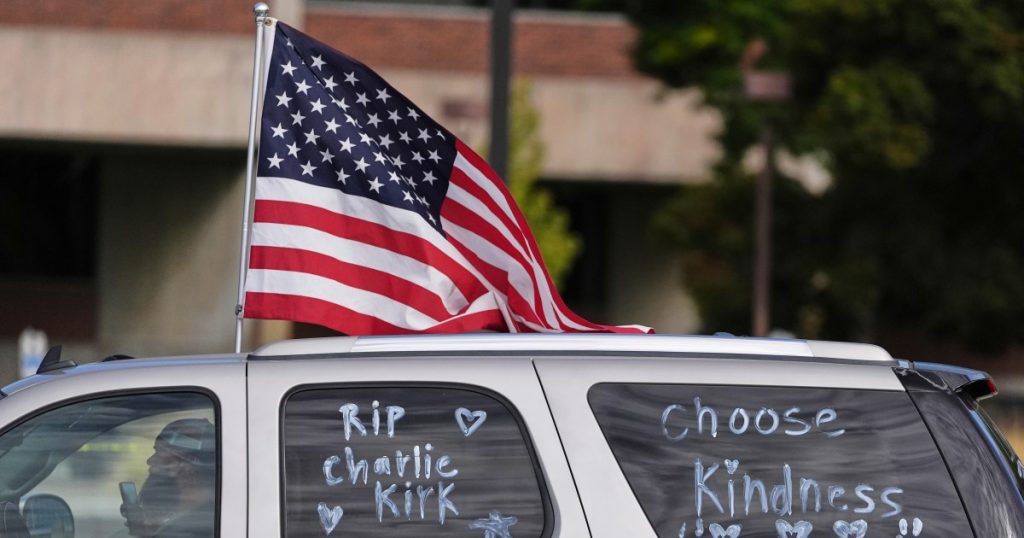
The suspect in the assassination of the conservative American activist Charlie Kirk espoused left-wing views, Utah’s governor has said, amid heightened tensions and recriminations over surging political violence in the United States. In an interview with NBC News’s Meet the Press on Sunday, Utah Governor Spencer Cox said the arrested suspect, 22-year-old Tyler Robinson, had a “leftist ideology” despite growing up in a conservative family. Recommended Stories list of 4 itemsend of list “We can confirm that, again, according to family and people that we’re interviewing, he does come from a conservative family. But his ideology was very different than his family, and so that’s part of it,” Cox said. Cox, a Republican, did not elaborate on Robinson’s suspected motive, but said the suspect had spent time in “dark places” online. “We do know, and again, this has been well publicised, that this was a very normal young man, a very smart young man,” Cox said. According to public records, Robinson registered as a nonpartisan voter in Utah, while his parents are registered Republicans. In a separate interview with CNN’s State of the Union, Cox said the information about Robinson’s left-wing views had come from interviews with family members and friends. “I really don’t have a dog in this fight. If this was MAGA, and a radicalised MAGA person, I would be saying that as well,” Cox said, referring to US President Donald Trump’s Make America Great Again movement. “That’s not what they’re sharing.” Cox also confirmed reports that Robinson had a romantic relationship with his transgender roommate, who was transitioning from male to female. Advertisement “This partner has been incredibly cooperative, had no idea that this was happening, and is working with investigators right now,” he said. Cox said he was not aware if Robinson’s relationship had any relevance to the assassination, but that authorities were investigating. “We’re trying to figure it out. I know everybody wants to know exactly why, and point the finger, and I totally get that. I do too,” he said. Kirk, the leader and cofounder of youth activist group Turning Post USA and a close ally of Trump, was shot dead on Wednesday during a speaking appearance at Utah Valley University. A key figure on the political right, Kirk was described in media profiles as a “rock star” among young conservatives, and played a pivotal role in driving the youth vote in Trump’s November re-election. A polarising figure, Kirk was lionised by conservatives as a defender of traditional values and a champion of free speech, but seen by liberals as an incendiary figure who stoked hatred towards racial minorities and members of the LGBTQ community. While both Republican and Democratic leaders have condemned Kirk’s murder, the killing has drawn attention to the extreme political polarisation pitting everyday Americans against one another. In the aftermath of Kirk’s assassination, some left-leaning Americans took to social media to celebrate, prompting outrage from conservatives and the launch of online campaigns to get people deemed disrespectful of Kirk’s memory fired from their jobs. On the right, some figures invoked the rhetoric of retribution and war. “If they won’t leave us in peace, then our choice is to fight or die,” tech billionaire Elon Musk said on X. Trump, who swiftly denounced the rhetoric of the “radical left” after Kirk’s killing, has declined opportunities to stress the need for unity and avoid partisan blame since the assassination. Speaking on Fox News’s Fox & Friends on Friday, Trump sought to paint left-wing extremism as worse than extremism on the right. “The radicals on the right oftentimes are radical because they don’t want to see crime,” Trump said. “The radicals on the left are the problem, and they’re vicious and they’re horrible, and they’re politically savvy.” In an interview with NBC News on Saturday, Trump said that while he would like to see the country heal, “we’re dealing with a radical left group of lunatics, and they don’t play fair and they never did”. Kirk’s assassination has prompted fears of further violence amid a documented increase in politically motivated attacks. Advertisement According to a tally by the Reuters news agency, the US experienced at least 300 instances of political violence between the January 6, 2021, riot at the US Capitol and the 2024 presidential election, marking it out as the worst period for such violence since the 1970s. Adblock test (Why?)
Russia-Ukraine war: List of key events, day 1,299
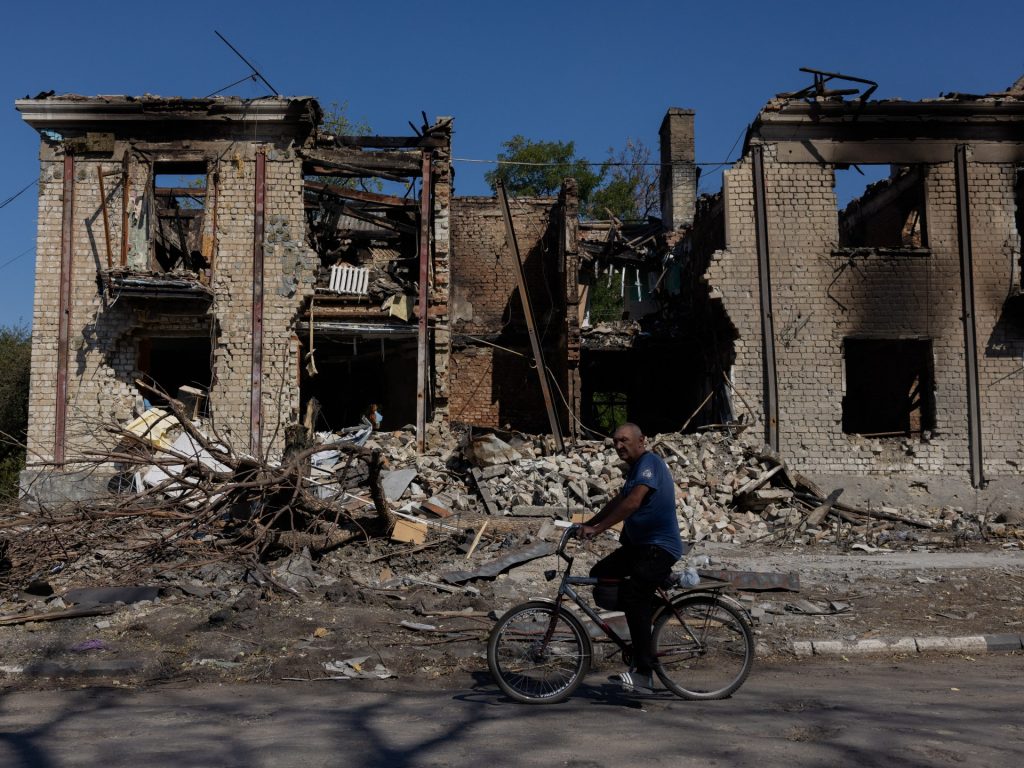
Here are the key events on day 1,299 of Russia’s war on Ukraine. Published On 15 Sep 202515 Sep 2025 Click here to share on social media share2 Share Here is how things stand on Sunday, September 14: Fighting Russian forces killed two people in Ukraine’s Kherson, including a 49-year-old woman who was found dead in the rubble of her home, authorities said, a day after Russian attacks killed six people across the country. Ukrainian President Volodymyr Zelenskyy said that Ukrainian soldiers were advancing in the border areas of the northern Sumy region, and said Russian forces had suffered significant losses in the Donetsk and Kharkiv regions along the 1,000km (620-mile) front line. Ukrainian forces said they had regained control of the village of Filia in the southeastern Dnipropetrovsk region, and reported bringing down a Russian ballistic missile and 164 drones of different types over the past day. Ukraine’s military also claimed a strike on Russia’s Kirishi oil refinery in the northwestern Leningrad region, causing “explosions and a fire”. The governor of the Leningrad region, Alexander Drozdenko, said the fire on the refinery’s grounds was caused by “falling drone debris”, after Russian forces shot down three Ukrainian drones. The fire was extinguished, and no one was injured, Drozdenko added. Drozdenko also said that two trains derailed in the Leningrad region due to “sabotage”, with one driver dying of his injuries while being transported to a hospital. The death toll from an explosion on another railway line in Russia’s Oryol region on Saturday has risen to three. All of the victims were Russian national guard troops, said Alexander Khinstein, the governor of the Kursk region. A Ukrainian military source claimed responsibility for the attack in Oryol, but not the deadly derailment in Leningrad, the AFP news agency reported. The Russian Ministry of Defence reported intercepting 361 Ukrainian drones and four aerial bombs and rockets from a US-made high mobility artillery rocket system (HIMARS) in a 24-hour period, according to the TASS news agency. Five people were injured in a Ukrainian attack on the city of Horlivka, in the Russian-occupied Donetsk region, Russian-appointed local official Ivan Prikhodko said in a post on Telegram. Cyberattacks Advertisement Russia’s Central Election Commission said that it experienced an “unprecedented attack” on its digital systems during elections on Sunday for dozens of regional officials, including 21 out of the country’s 80 governors. Russian officials did not immediately comment on who they thought might be behind the alleged attacks. Politics and Diplomacy United States President Donald Trump again said he was willing to impose sanctions on Russia, but said Europe must do more, including ceasing to buy oil from Russia. “Europe is buying oil from Russia. I don’t want them to buy oil,” Trump told reporters. “And the sanctions… that they’re putting on are not tough enough, and I’m willing to do sanctions, but they’re going to have to toughen up their sanctions commensurate with what I’m doing.” Romania summoned Moscow’s envoy after a drone breached its airspace during a Russian attack on neighbouring Ukraine, informing him that “such recurring incidents contribute to the escalation and amplification of threats to regional security”. Annalena Baerbock, the new president of the United Nations General Assembly, said that UN peacekeepers could play a role in supporting a peace solution to the war in Ukraine. “If a peace treaty is reached, it must be secured as best as possible,” Baerbock told the Sunday edition of the Bild newspaper. Former United Kingdom Prime Minister Boris Johnson called for European troops to be deployed on Ukrainian soil in an interview with the Kyiv Independent. “If they don’t want foreign troops on Ukrainian soil, I’ve got a brilliant idea – they bog off,” Johnson said. Adblock test (Why?)
Are weddings a financial nightmare?

Today on The Stream: Weddings used to be about the couple; now they’re about the content. Social media’s influence and society’s pressure for the “perfect” wedding often push couples into debt before they even say “I do”. We’re breaking down whether a budget-friendly wedding is still truly possible – and examining the heavy financial burden that comes with a lavish celebration. Presenter: Stefanie Dekker Guests:Claudia Sokolova – Wedding planner and content creatorKiara Brokenbrough – Content creatorSumera Batool – Associate professor at Lahore College for Women University Published On 14 Sep 202514 Sep 2025 Click here to share on social media share2 Share Adblock test (Why?)
Marc Marquez wins San Marino MotoGP to close in on world championship title

Marquez’s latest victory means he can clinch a seventh MotoGP world title at the next race in Japan in a fortnight. Ducati’s Marc Marquez resisted a spirited challenge from Aprilia’s Marco Bezzecchi to win the San Marino Grand Prix on Sunday, taking his revenge after crashing out of the lead in Saturday’s sprint, and inching closer to the MotoGP title. Bezzecchi had inherited victory in the sprint when Marquez crashed out. This time, however, the determined Spaniard overtook the Aprilia rider on lap 12, having started on the second row of the grid, and never looked back. Recommended Stories list of 4 itemsend of list Marquez’s 11th race victory of the season takes him to 512 points – a record tally for a MotoGP rider in a single season – and he celebrated his victory by unzipping his leathers and holding his red suit up on the podium like a matador. Gresini Racing’s Alex Marquez finished a distant third, and brother Marc, with a 182-point lead, can clinch his seventh title at the Japanese Grand Prix this month. “Today I gave everything I had. It’s true that the mistake from yesterday gave me extra concentration, extra power, extra energy,” an exhausted Marc Marquez said. “I was just there following him [Bezzecchi], trying to push him always super close, because it’s impossible to do 27 laps without any mistake. And in the end, he did a small mistake on turn eight, and then I led the race. “Super important for Ducati; I felt the pressure this weekend.” Six more rounds remain, but Marc Marquez can now win his first title since 2019 if he outscores brother Alex by just three points in Japan. Superb launch At the start, Marc had a superb launch off the line and he veered to the outside to quickly move up to second behind polesitter Bezzecchi while Alex was pushed down to third. Advertisement As the top three streaked away, Yamaha’s Fabio Quartararo found it difficult to maintain that pace, and he was soon battling with KTM’s Pedro Acosta, who eventually found his way past the former champion to chase the leading pack. But Acosta’s hopes of fighting for the podium went up in smoke when he retired with a broken chain, with the young Spaniard furiously wagging his finger at the bike after he stopped on the side of the track. Ducati’s Francesco Bagnaia had another race to forget in a nightmare season for the twice champion, who crashed out of seventh place, his third place in the championship now seriously under threat from Bezzecchi. Up front, Marc continued piling the pressure on Bezzecchi, and the Aprilia rider finally buckled on lap 12 when he was a breath late on the brakes and went wide, opening the door for the red Ducati to ease past him and into the lead. Marc Marquez, left, trailed polesitter Marco Bezzecchi for the first 12 laps of the San Marino MotoGP [Andreas Solaro/AFP] Unrelenting Bezzecchi Bezzecchi gave chase, unrelenting and eager to reclaim the lead. But Marc remained calm and the Spaniard was in no mood to crash out of the lead twice in one weekend. Bezzecchi shook his head in frustration with six laps left as Marc set the fastest lap of the race. Marc tried his best to shake off the younger Italian, who found an extraordinary late race pace to challenge for the lead. But the Ducati rider responded once again as they traded fastest laps and left third-placed Alex more than six seconds behind. “Besides [missing out on] the victory, this is maybe the best race of my life, because I was super competitive all weekend – pole position, sprint win, second place,” Bezzecchi said. “I was close to Marc, who is at the moment the strongest on the grid. I’m very happy, I gave my all, I’m destroyed!” VR46 Racing riders Franco Morbidelli and Fabio Di Giannantonio finished fourth and fifth, respectively, while Gresini’s Fermin Aldeguer was sixth. Ducati Lenovo Team’s Marc Marquez crosses the line to win the San Marino MotoGP [Andreas Solaro/AFP] Adblock test (Why?)
More Middle East mayhem amid unconditional US support for Israel?
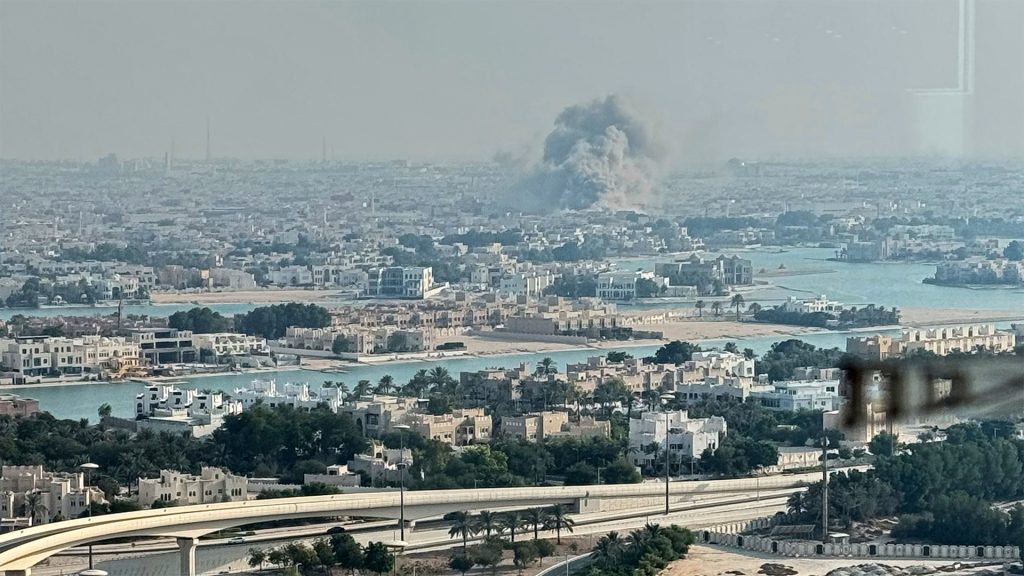
US political analyst John Mearsheimer argues that Israel attacked Qatar to preclude any closure to the war on Gaza. In the aftermath of an Israeli attack on Qatar targeting the leadership of Hamas, American political scientist John Mearsheimer argues, “The Israelis are interested in making sure there are no negotiations that settle the conflict in Gaza.” Mearsheimer tells host Steve Clemons that the United States and Israel “basically act as a tag team”, and despite a mild rebuke by President Donald Trump, “the US supports Israel unconditionally”. He adds that Israel has three main strategic goals: expand territory, move the Palestinians out of all conquered territory, and ensure that all countries in the region are weak. Published On 14 Sep 202514 Sep 2025 Click here to share on social media share2 Share Adblock test (Why?)

